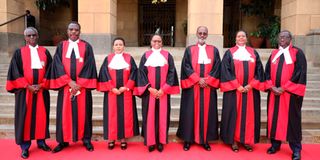Judiciary gaining ground in war against terrorism

Supreme Court judges (from left) Isaac Lenaola, Dr Smokin Wanjala, Philomena Mwilu, Martha Koome, Mohamed Ibrahim, Njoki Ndung’u and William Ouko on January 20, 2022.
Just over a week ago, a respected global report recognised Kenya as one of the few countries that have made serious progress in fighting terrorism.
Kenya’s counter-terrorism efforts have seen the terror mongers find it more difficult to operate within its borders, hence reduced deaths and maiming of both civilians and security agents as well as damage to property.
According to the “Global Terrorism Index 2024”, the impact of terrorism in Kenya decreased from the rating of ‘High’ in 2022 to ‘Medium’ in 2023. Terrorism deaths attributed to Somalia-based Al-Shabaab terror group fell from 800 in 2022 to 499 in 2023, a 38 per cent decline, with 86 per cent occurring in Somalia and only 14 per cent in Kenya.
The report, compiled by the Sidney-based Institute for Economics and Peace, says Kenya got 5.616 points. The country with the highest score—meaning grappling with the biggest impact of terrorism in the world—was Burkina Faso, which scored 8.571. Malaysia has the least impact on the index, at 0.192.
There are many factors that have contributed to these milestones towards defeating the agents of death that terrorists are. But the most uncelebrated and least glorified could be Kenya’s Judiciary.
Although our courts don’t hunt and kill the killers, the justice they have been serving lately must be sending the right message to both the active and would-be terror mongers. And this is deterring further attacks.
10 years in prison
A few examples will suffice here. Mid last month, a court in Nairobi dismissed an appeal by one Ismael Mona Otieno, who was convicted and sentenced to 10 years in prison for the offence of being a member of an outlawed group. In his appeal, Ismael wanted the Milimani High Court to quash the verdict by Senior Principal Magistrate Bernard Ochoi and acquit him of the offence.
Plotting to bomb
Just over a week earlier, on March 7, another court sentenced some two other terrorists to 25 years imprisonment each. The two had been found guilty of plotting to bomb an unidentified building in Nairobi some six years ago. Their female accomplice was handed a three-year jail term for forging an ID.
Abdimajit Hassan Adan and Mohammed Osman Nane were found guilty of being in possession of improvised explosive devices (IEDs), seven projectile bombs and AK 47 rifles. Lydia Nyawira Mburu was found guilty of forging a national ID card bearing the name Jirma Huka Galgalo, who was a member of Al-Shabaab, purposing it to be a genuine document. Jirma has since died.
Earlier, in October 2020, a judge sentenced Mohammed Ahmed Abdi and Hussein Hassan Mustafa to serve 33 and 18 years, respectively, in prison after they were convicted of helping Islamist militants attack Nairobi’s Westgate shopping mall in 2013. At least 67 people died in the assault by Al-Shabaab.
Abdi and Mustafa were charged with planning and committing acts of terror, as well as supporting and helping a terrorist group. The ruling of the two men’s appeal against and is expected at the Court of Appeal on April 16.
These few examples of judicious judgments by the Judiciary go a long way in demonstrating just how important every cog in the criminal justice system is if we have to eradicate not just terrorism but all other forms of crime in the country.
Security agencies
From the security agencies to the Office of the Director of Public Prosecutions (ODPP), the Judiciary and the Kenya Prisons Service, everybody counts.
It is worth noting that it was the synergy initiated by the immediate former DPP that is now bearing the fruits we are witnessing from the corridors of justice.
One also cannot over-emphasise the role the correctional facilities, the prisons, have played in reforming the offenders and preparing them for responsible and productive lives ones their sentences are done with.
Going forward, it is important that the collaboration between the Judiciary, the Prisons and other security sector players is sustained to build on the gains made in safeguarding Kenya against terrorism and other crimes.
Mr Mugwang’a, a communications consultant, is a member of the Crime Journalists Association of Kenya (CJAK). [email protected].





